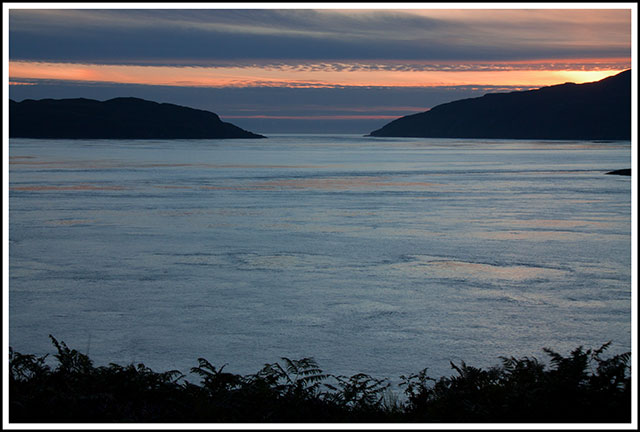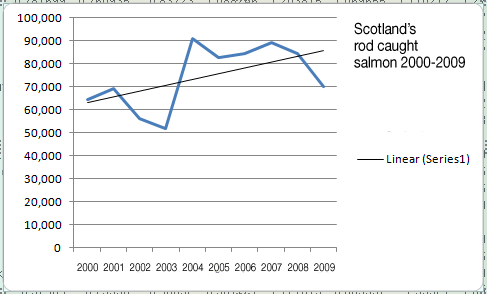RELATIONS between wild game fishing interests and the Scottish Government over fish farming controls have suffered another reverse with the collapse of a key agreement set up to try to establish peace between the salmon industry and anglers.
Representatives of wild fish angling in the Lower Lorne area of Argyll have withdrawn their support for what is called an ‘area management agreement’ – a cornerstone of the Government’s attempts bring about co-operation between salmon and sea trout interests and local fish-farming companies.
The anglers blame the “serial failure” of fish farm operators to honour their commitments. Roger Brook, Chairman of the Argyll District Salmon Fishery Board, said:
The demise of the Lower Lorne AMA has been caused by the repeated failure of the fish farmers to honour the agreement particularly when it is commercially inconvenient.
“I believe that wild fish signatories to the AMA were entirely justified in saying ‘enough is enough’. If any one party is only paying lip-service to what they have signed up to, then clearly it is futile to continue”.
Confidentiality clauses in the Lower Lorne agreement preclude wild fish interests from publishing details of the alleged breaches. Signatories to the agreement on the aquaculture side were the fish farming companies Pan Fish Scotland, Lakeland Marine Farms and Kames Fish Farming.
Wild fish interests were represented by the Argyll DSFB, the Argyll Fisheries Trust and two river improvement associations.
The Lower Lorne area covers 75 miles of coast including sea lochs such as Crinan, Craignish, Melfort and Feochan and river systems including the Nell, Feochan, Euchar, Oude and Add.

Readers of Between The Lines, will be aware that relations between the ASFB on the one hand, and the salmon fishing industry and the Government on the other, are at a low ebb.
Anglers argue vigorously that there is a direct link between intensive marine salmon farming, and disease and decline in migratory game fish. The salmon industry insists this is incorrect and say their businesses are more important commercially and socially.
The Association of Salmon Fishery Boards (ASFB), the umbrella body representing all salmon fishing operations in Scotland questions the viability of the Governments flagship policy of fostering local dialogue as a way of resolving differences between wild fish interests and commercial aquaculture.

ASFB managing director Andrew Wallace said: “It had been hoped that the issue of impacts on wild fish by salmon aquaculture could have been resolved and worked through by negotiation. In some situations some progress has been made.
“However, the general intransigence by parts of the Scottish salmon farming industry, the failure of some companies to abide by conditions set out in AMAs and the industry’s failure to give even the slightest credence to the widely understood view that industrial scale fish farming can and does, in certain places, impact migratory fisheries, is starting to seriously undermine this whole approach to managing salmon farm impacts”.
Questions are now emerging about the future of the Government’s Tripartite Working Group, the parent body formed in 1999 to foster best practice in the aquaculture industry and encourage local co-operation agreements. Several doubt whether it can survive.
There are 18 agreements in place around Scotland, established chiefly as a means of seeking to contain the incidence of sea lice infestation. Many have had a significantly positive effect.
Scotland is the largest producer of farmed salmon in the EU. Figures released this week show production up 12% to 144,200 tonnes in 2009 and Roseanna Cunningham the environment minister was quick to laud the value which this represents both in terms of sales and jobs.
She said the government had “great confidence in the future of the fish farming sector.” She added:
Aquaculture continues to be a growing and increasingly important industry to the Scottish economy, helping to underpin sustainable economic growth in rural and coastal communities in the Highlands and Islands.”
The Government said this week that the Lorne agreement breakdown was “regrettable”.
Interestingly, just four weeks ago, fisheries minister Richard Lochhead was announcing Marine Scotland’s 2009 game fishing catches and chose to focus on catch-and-release statistics rather than overall return trends.
Some 72,600 salmon and grilse were recorded caught by rod and line, and Lochhead merely noted that DSFBs “should continue to work closely with local interests to try and address stock vulnerabilities.”
For a broader picture of the trends, you might like to have a look at the Salmon Atlas and digest its table of 52 main Scottish rivers by returns over the last 10 years. It is a complex set of data, but over the decade is strongly positive.
However, more recently as illustrated here in Marine Scotland’s own statistics, there is a disconcerting downward turn. And against the 10 year average, 2009 salmon rod catches fell 5%.
